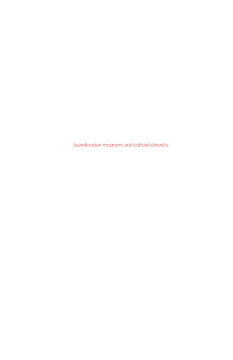
Additional Information
Book Details
Abstract
Museums face the task of representing the similarities and differences that exist between groups, such as national identities and indigenous and minority voices, material and intangible heritage, and current status and past history. In order to achieve this aim, a complex and not always easily compatible set of interests have to be taken into account, from those of the museum itself, to those of its main audiences, sources of support, and the groups that are, or wish to be, represented. The approach taken by Scandinavian museums in response to this challenge highlights a very active concern for forms of cultural diversity and how they are interrelated.
By bringing together debates and discussions of diversity, this volume offers insight into the Nordic region and its diverse peoples, from the Sámi and the Inuit to newer immigrants. It presents a set of historical reviews on the formation of national museums and emerging and contested perceptions of national identity. Furthering the general debate on representations of diversity and museums, it also offers museum curators possible ways forward.
Katherine Goodnow is Professor at the Department of Information Science and Media Studies at the University of Bergen, Norway. She has published widely on museums and cultural diversity. Her most recent books in the field include Challenge and transformation: Museums in Cape Town and Sydney and Museums, the media and refugees: Stories of crisis, control and compassion. Goodnow combines research with filmmaking and has produced television series and documentaries for Norwegian national broadcasters.
Haci Akman is Associate Professor at the Department of Archaeology, History, Culture and Religious Science, University of Bergen. His research interests include migration, diaspora processes, ethnicity, cultural heritage and museums and diversity. Recent publications in these fields focus on Kurdish and Jewish diaspora societies in the United Kingdom and Norway. Akman is currently working on the development of the Norwegian Kurdish Virtual Museum.
Table of Contents
| Section Title | Page | Action | Price |
|---|---|---|---|
| Scandinavian museums and cultural diversity | iii | ||
| Copyright | iv | ||
| Contents | v | ||
| Foreword | vii | ||
| The construction of identities | ix | ||
| Today’s museum | xxix | ||
| Section I. Museums, national minorities and the indigenous | xxxvi | ||
| Chapter 1. Indigenous peoples and national minorities in Norway | 1 | ||
| Chapter 2. Cultural diversity at the Nordiska Museet in Stockholm | 9 | ||
| Chapter 3. Sámi museums and cultural heritage | 23 | ||
| Chapter 4. Return of the prodigal son | 30 | ||
| Chapter 5. An appetite whetted | 37 | ||
| Chapter 6. The Danish Jewish Museum | 42 | ||
| Chapter 7. Cultural minorities in Danish museums | 54 | ||
| Chapter 8. Kven culture and history in museum terms | 68 | ||
| Section II. Museums and “new migrants” | 88 | ||
| Chapter 9. The Museum of World Culture | 89 | ||
| Chapter 10. Seeking the multicultural in the arts in Finland | 101 | ||
| Chapter 11. Norwegian Yesterday, Today, Tomorrow? | 113 | ||
| Chapter 12. Embroidered history | 124 | ||
| Chapter 13. Norwegian Kurdish Virtual Museum | 130 | ||
| Chapter 14. As in a mirror | 140 | ||
| Chapter 15. The Multicultural Centre, Botkyrka, Sweden | 146 | ||
| Section III. Nation and heritage | 150 | ||
| Chapter 16. Cultural heritage, cultural diversity and museums in Sweden | 151 | ||
| Chapter 17. Intangible cultural heritage and ethnographicmuseum practice in a global perspective | 161 | ||
| Chapter 18. Museums and collective identity | 172 | ||
| Chapter 19. Pluralism, cultural heritage and the museum | 187 | ||
| Chapter 20. Representing community | 195 | ||
| Chapter 21. Museums and related institutions on the FaroeIslands | 212 | ||
| Chapter 22. Renegotiating identity in the National Museumof Iceland | 221 | ||
| Chapter 23. Exhibition forms and influential circumstances | 230 | ||
| Notes on the contributors | 246 | ||
| Index | 251 |
